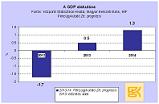| Contact |  |
 |
You are here
Home ›An attempt to speed up privatization in Hungary: Experiences with the E-loan
The Hungarian government introduced several preferential methods in the last years in order to accelerate privatization and to promote the creation of a wide, strong proprietary middle-class. The paper summarizes the empirical experiences with the first and most widespread privatization credit, the so called Existence Loan. It describes the key features and modification of the scheme, the role of the E-loan in the growth of private business and in the privatization process. Thereafter the different types of borrowers and the emerging ownership pattern are reviewed. Finally, the macro and micro economic effects of the E-loan are analyzed, together with the general preconditions supporting or obstructing the use of preferential credit facilities in changing the ownership structure.
The paper argues that some effects of the E-loan are undoubtedly favorable. It has supported the speeding up of privatization as well as the growth of private business through the expansion of existing organizations and especially the emergence of new ones. On the other hand, however, the E-loan scheme is a threat from the point of view of both the companies concerned and the economy as a whole. The problems with the E-loan concern three critical issues: the biased preference of privatization, separating this action from the general economic environment, the credit form of encouraging demand and the risk allocation in the economy.
Paper presented at the workshop "Output decline in Eastern Europe - prospects for recovery?" Laxemburg, November 1993
| Attachment | Size |
|---|---|
| 90.33 KB |
Financial Research Plc.
IKU Innovation Research Centre
News and events
Working Paper Series
-
11/26/2011 - 15:38
-
11/25/2011 - 16:00
-
11/18/2011 - 20:00
-
08/20/2011 - 15:31
-
07/18/2011 - 19:53



